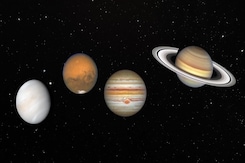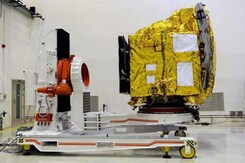Planetary Science
- All
- News
- Videos
-

ISRO Shares Details On Cosmic Dust Particles That Hit Earth Every Thousand Seconds
- Wednesday January 7, 2026
- Science | Edited by Srishti Singh Sisodia
DEX-like instruments are crucial in planetary exploration as they can help study the atmospheres of planets.
-
 www.ndtv.com
www.ndtv.com
-

Astronomers Measure Mass and Distance of a Rogue Planet for the First Time in History
- Tuesday January 6, 2026
- Written by Gadgets 360 Staff
Astronomers have measured the mass and distance of a rogue planet for the first time. Using observations from Earth and the Gaia space telescope, the planet was found to be just under Saturn’s mass and about 10,000 light-years away. The study highlights how free-floating planets are ejected from star systems and improves understanding of planetar...
-
 www.gadgets360.com
www.gadgets360.com
-

Astronomers Successfully Weigh a Starless ‘Rogue Planet’ Drifting Through the Milky Way
- Monday January 5, 2026
- Written by Gadgets 360 Staff
Astronomers have precisely measured the mass of a rogue planet wandering through the Milky Way using a rare gravitational microlensing event. By combining observations from ground-based telescopes across three continents with data from ESA’s Gaia spacecraft, researchers determined the planet’s distance and found it to be about the mass of Satur...
-
 www.gadgets360.com
www.gadgets360.com
-

Hubble Observations Turn Exoplanet Into Dust; Reveal Rare Double Asteroid Impact in Nearby System
- Saturday January 3, 2026
- Written by Gadgets 360 Staff
NASA’s Hubble Space Telescope has revealed that a vanished exoplanet near the star Fomalhaut was never a planet at all. Scientists discovered two rare, violent collisions between asteroid-sized bodies, producing glowing debris clouds that briefly mimicked planets. The findings offer a rare glimpse into how planetary systems evolve and how mislead...
-
 www.gadgets360.com
www.gadgets360.com
-

NASA’s Curiosity Rover Sends Stunning Sunrise-and-Sunset Holiday Postcard from Mars
- Wednesday December 31, 2025
- Written by Gadgets 360 Staff
NASA’s Curiosity rover has released a festive holiday postcard from Mars, blending a Martian sunrise and sunset into a single panoramic image. Captured on November 18, 2025, the view combines a blue-tinted morning sky with a golden afternoon hue, showcasing Gale Crater in striking detail. Created by stitching images taken hours apart, the artisti...
-
 www.gadgets360.com
www.gadgets360.com
-

JWST Reveals Powerful Winds and Dense Atmosphere on Scorching Exoplanet TOI-561b
- Wednesday December 31, 2025
- Written by Gadgets 360 Staff
Astronomers using NASA’s James Webb Space Telescope have found compelling evidence that TOI-561b, an ultra-hot rocky exoplanet orbiting its star every 11 hours, still retains a dense atmosphere. Temperatures measured on both its day and night sides are far lower than expected for a bare rock, implying powerful winds and efficient heat transport. ...
-
 www.gadgets360.com
www.gadgets360.com
-

Biggest Space Discoveries in 2025: From New Comets and Black Holes to Sign of Life on Mars
- Monday December 29, 2025
- Written by Gadgets 360 Staff
The year 2025 proved extraordinary for astronomy, delivering discoveries that stretched from our cosmic backyard to distant galaxies. Scientists tracked Comet 3I/ATLAS, only the third known interstellar object, while nearby stars like Barnard’s Star and Alpha Centauri revealed new planetary companions. On Mars, strange “leopard spots” raised ...
-
 www.gadgets360.com
www.gadgets360.com
-

The Most Exciting Exoplanet Discoveries of 2025: Know the Strange Worlds Scientists Have Found
- Sunday December 28, 2025
- Written by Gadgets 360 Staff
Astronomers marked a milestone year as confirmed exoplanets surpassed 6,000 in 2025. Discoveries ranged from planets orbiting two suns to worlds losing their atmospheres or forming in real time. The findings reshaped ideas about how planets form, survive, and evolve across the Milky Way.
-
 www.gadgets360.com
www.gadgets360.com
-

Interstellar Comet 3I/ATLAS Shows Rare Wobbling Jets in Sun-Facing Anti-Tail
- Saturday December 27, 2025
- Written by Gadgets 360 Staff
Interstellar comet 3I/ATLAS reveals rare wobbling jets in its sun-facing anti-tail, stretching over 620,000 miles. Observed from July to September 2025, the jets indicate the comet’s icy core rotates once every 15.5 hours. As only the third interstellar object known, 3I/ATLAS provides unique insights into cometary behaviour and formation in dista...
-
 www.gadgets360.com
www.gadgets360.com
-

Interstellar Comet 3I/ATLAS Shows Wobbling Jets in Rare Sun-Facing Tail, Surprising Astronomers
- Wednesday December 24, 2025
- Written by Gadgets 360 Staff
Astronomers have detected strange wobbling jets in the rare sun-facing tail of interstellar comet 3I/ATLAS. Observed as the comet neared the Sun, the shifting jets reveal new details about how material escapes from comets formed around other stars, offering rare insight into alien planetary systems.
-
 www.gadgets360.com
www.gadgets360.com
-

NASA Captures Asteroids Colliding Around Nearby Star Fomalhaut For The First Time
- Saturday December 20, 2025
- Science | Edited by Astitva Raj
The team will continue to monitor CS2 using Hubble for the next three years to observe its evolution.
-
 www.ndtv.com
www.ndtv.com
-

Hubble Captures Rare Collision in Nearby Planetary System, Revealing Violent Planet Formation
- Friday December 19, 2025
- Written by Gadgets 360 Staff
Astronomers using NASA’s Hubble Space Telescope have witnessed rare collisions between rocky bodies in the Fomalhaut system. The glowing debris clouds created by these impacts offer a unique glimpse into how planets form and highlight challenges in identifying true exoplanets.
-
 www.gadgets360.com
www.gadgets360.com
-

Earth’s Atmosphere Has Been Leaking Onto the Moon for Billions of Years, Study Finds
- Tuesday December 16, 2025
- Written by Gadgets 360 Staff
Earth’s atmosphere has been leaking atoms and molecules to the moon for billions of years, preserving a historical record and potential resources for future lunar missions.
-
 www.gadgets360.com
www.gadgets360.com
-

New Orbital Clues Reveal How Hot Jupiters Moved Close to Their Stars
- Tuesday December 16, 2025
- Written by Gadgets 360 Staff
Researchers reveal some hot Jupiters drifted inward smoothly through protoplanetary disks, offering clues to planetary system formation and stability.
-
 www.gadgets360.com
www.gadgets360.com
-

JWST Detects Thick Atmosphere on Ultra-Hot Rocky Exoplanet TOI-561 b
- Sunday December 14, 2025
- Written by Gadgets 360 Staff
Astronomers using the James Webb Space Telescope have discovered compelling evidence of a thick atmosphere surrounding TOI-561 b, an ultra-hot rocky exoplanet orbiting its star every 11 hours. Despite extreme radiation and molten surface conditions, the planet appears cooler than expected, suggesting heat-redistributing atmospheric winds and volati...
-
 www.gadgets360.com
www.gadgets360.com
-

ISRO Shares Details On Cosmic Dust Particles That Hit Earth Every Thousand Seconds
- Wednesday January 7, 2026
- Science | Edited by Srishti Singh Sisodia
DEX-like instruments are crucial in planetary exploration as they can help study the atmospheres of planets.
-
 www.ndtv.com
www.ndtv.com
-

Astronomers Measure Mass and Distance of a Rogue Planet for the First Time in History
- Tuesday January 6, 2026
- Written by Gadgets 360 Staff
Astronomers have measured the mass and distance of a rogue planet for the first time. Using observations from Earth and the Gaia space telescope, the planet was found to be just under Saturn’s mass and about 10,000 light-years away. The study highlights how free-floating planets are ejected from star systems and improves understanding of planetar...
-
 www.gadgets360.com
www.gadgets360.com
-

Astronomers Successfully Weigh a Starless ‘Rogue Planet’ Drifting Through the Milky Way
- Monday January 5, 2026
- Written by Gadgets 360 Staff
Astronomers have precisely measured the mass of a rogue planet wandering through the Milky Way using a rare gravitational microlensing event. By combining observations from ground-based telescopes across three continents with data from ESA’s Gaia spacecraft, researchers determined the planet’s distance and found it to be about the mass of Satur...
-
 www.gadgets360.com
www.gadgets360.com
-

Hubble Observations Turn Exoplanet Into Dust; Reveal Rare Double Asteroid Impact in Nearby System
- Saturday January 3, 2026
- Written by Gadgets 360 Staff
NASA’s Hubble Space Telescope has revealed that a vanished exoplanet near the star Fomalhaut was never a planet at all. Scientists discovered two rare, violent collisions between asteroid-sized bodies, producing glowing debris clouds that briefly mimicked planets. The findings offer a rare glimpse into how planetary systems evolve and how mislead...
-
 www.gadgets360.com
www.gadgets360.com
-

NASA’s Curiosity Rover Sends Stunning Sunrise-and-Sunset Holiday Postcard from Mars
- Wednesday December 31, 2025
- Written by Gadgets 360 Staff
NASA’s Curiosity rover has released a festive holiday postcard from Mars, blending a Martian sunrise and sunset into a single panoramic image. Captured on November 18, 2025, the view combines a blue-tinted morning sky with a golden afternoon hue, showcasing Gale Crater in striking detail. Created by stitching images taken hours apart, the artisti...
-
 www.gadgets360.com
www.gadgets360.com
-

JWST Reveals Powerful Winds and Dense Atmosphere on Scorching Exoplanet TOI-561b
- Wednesday December 31, 2025
- Written by Gadgets 360 Staff
Astronomers using NASA’s James Webb Space Telescope have found compelling evidence that TOI-561b, an ultra-hot rocky exoplanet orbiting its star every 11 hours, still retains a dense atmosphere. Temperatures measured on both its day and night sides are far lower than expected for a bare rock, implying powerful winds and efficient heat transport. ...
-
 www.gadgets360.com
www.gadgets360.com
-

Biggest Space Discoveries in 2025: From New Comets and Black Holes to Sign of Life on Mars
- Monday December 29, 2025
- Written by Gadgets 360 Staff
The year 2025 proved extraordinary for astronomy, delivering discoveries that stretched from our cosmic backyard to distant galaxies. Scientists tracked Comet 3I/ATLAS, only the third known interstellar object, while nearby stars like Barnard’s Star and Alpha Centauri revealed new planetary companions. On Mars, strange “leopard spots” raised ...
-
 www.gadgets360.com
www.gadgets360.com
-

The Most Exciting Exoplanet Discoveries of 2025: Know the Strange Worlds Scientists Have Found
- Sunday December 28, 2025
- Written by Gadgets 360 Staff
Astronomers marked a milestone year as confirmed exoplanets surpassed 6,000 in 2025. Discoveries ranged from planets orbiting two suns to worlds losing their atmospheres or forming in real time. The findings reshaped ideas about how planets form, survive, and evolve across the Milky Way.
-
 www.gadgets360.com
www.gadgets360.com
-

Interstellar Comet 3I/ATLAS Shows Rare Wobbling Jets in Sun-Facing Anti-Tail
- Saturday December 27, 2025
- Written by Gadgets 360 Staff
Interstellar comet 3I/ATLAS reveals rare wobbling jets in its sun-facing anti-tail, stretching over 620,000 miles. Observed from July to September 2025, the jets indicate the comet’s icy core rotates once every 15.5 hours. As only the third interstellar object known, 3I/ATLAS provides unique insights into cometary behaviour and formation in dista...
-
 www.gadgets360.com
www.gadgets360.com
-

Interstellar Comet 3I/ATLAS Shows Wobbling Jets in Rare Sun-Facing Tail, Surprising Astronomers
- Wednesday December 24, 2025
- Written by Gadgets 360 Staff
Astronomers have detected strange wobbling jets in the rare sun-facing tail of interstellar comet 3I/ATLAS. Observed as the comet neared the Sun, the shifting jets reveal new details about how material escapes from comets formed around other stars, offering rare insight into alien planetary systems.
-
 www.gadgets360.com
www.gadgets360.com
-

NASA Captures Asteroids Colliding Around Nearby Star Fomalhaut For The First Time
- Saturday December 20, 2025
- Science | Edited by Astitva Raj
The team will continue to monitor CS2 using Hubble for the next three years to observe its evolution.
-
 www.ndtv.com
www.ndtv.com
-

Hubble Captures Rare Collision in Nearby Planetary System, Revealing Violent Planet Formation
- Friday December 19, 2025
- Written by Gadgets 360 Staff
Astronomers using NASA’s Hubble Space Telescope have witnessed rare collisions between rocky bodies in the Fomalhaut system. The glowing debris clouds created by these impacts offer a unique glimpse into how planets form and highlight challenges in identifying true exoplanets.
-
 www.gadgets360.com
www.gadgets360.com
-

Earth’s Atmosphere Has Been Leaking Onto the Moon for Billions of Years, Study Finds
- Tuesday December 16, 2025
- Written by Gadgets 360 Staff
Earth’s atmosphere has been leaking atoms and molecules to the moon for billions of years, preserving a historical record and potential resources for future lunar missions.
-
 www.gadgets360.com
www.gadgets360.com
-

New Orbital Clues Reveal How Hot Jupiters Moved Close to Their Stars
- Tuesday December 16, 2025
- Written by Gadgets 360 Staff
Researchers reveal some hot Jupiters drifted inward smoothly through protoplanetary disks, offering clues to planetary system formation and stability.
-
 www.gadgets360.com
www.gadgets360.com
-

JWST Detects Thick Atmosphere on Ultra-Hot Rocky Exoplanet TOI-561 b
- Sunday December 14, 2025
- Written by Gadgets 360 Staff
Astronomers using the James Webb Space Telescope have discovered compelling evidence of a thick atmosphere surrounding TOI-561 b, an ultra-hot rocky exoplanet orbiting its star every 11 hours. Despite extreme radiation and molten surface conditions, the planet appears cooler than expected, suggesting heat-redistributing atmospheric winds and volati...
-
 www.gadgets360.com
www.gadgets360.com
























